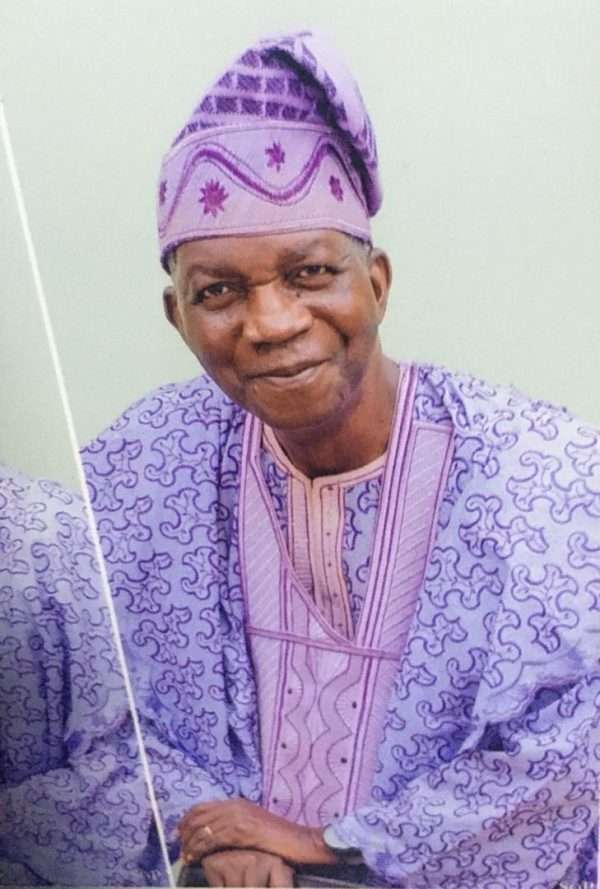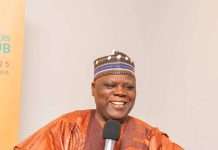
Accomplished pharmacy educator and retired Professor of Pharmaceutical Microbiology, Prof. Philip Olurinola is a triple Fellow of the pharmacy profession in Nigeria. He is Fellow of the Pharmaceutical Society of Nigeria (FPSN), Fellow of the Nigeria Academy of Pharmacy (FNAPharm), and Fellow of the West African Postgraduate College of Pharmacists (FPCPharm). In this interview with Moses Dike, the erudite scholar reminisces on his background, education and career journey. He recalls some of the high points of his illustrious career, especially the struggle to have a pharmacy faculty established at the University of Ilorin (UNIILORIN). Excerpts:
It is a pleasure to welcome you to our Senior Citizens’ column. Kindly tell us about your early life, education, and the events that have helped to shape your adult personality.
I was born on 4 October, 1939, to Mr (later Elder, Chief) John and Mrs Rachael Ogunrinola of Iwo, a town in Isin LGA of Kwara State. Perhaps I can be labelled a “life accademician”, as I have spent the most part of my years on earth in schools and school environments – learning or teaching – from pre-primary school to tertiary schools.
I was sent to the village church kindergarten school in 1943, before I was four years old, to play, sing and sleep. The church kindergarten school eventually developed to SIM Primary School, Iwo; and later to Iwo-Owu Central Primary School. I graduated among the first set of Standard Six pupils of the school, in December 1954, with a First School Leaving Certificate.
I attended Titcombe College (a mission secondary school, in Egbe, Kogi State, Nigeria, for my secondary education. This was from January 1955 to December 1960. In October 1961, I started my pharmacy education journey at the School of Pharmacy, Zaria, and graduated in June 1966, with the award of two diplomas – Chemists and Druggists Diploma, awarded by the then Pharmacists Board of Nigeria (PBN); and Pharmaceutical Chemists Diploma, awarded by the school.
I was appointed a lecturer at the school in November 1966 and served till September 1967. I was sent on study leave, along with the late Pharm. Olatunji Amodu, and the late Benjamin Fashanu, to study at the University of Ife, Ibadan Campus (now Obafemi Awolowo University), for the B.Pharm. degree. I was there from September 1967 to May 1969. It was there I met Festus Ogunbona, Wilfred Opakunle, the late Wura Amosun (later Kuti), Kunle Odunaike, the late George Oyefeso (Uncle Joe), Deji Osinoiki, Kayode Omotayo, and others of their generation.
However, I did not graduate. I was withdrawn! So, I returned to Kano State, as a diploma pharmacist, as I had been registered as such since July 1966. I served briefly as a hospital pharmacist at Kano City Hospital (presently Bayero University Teaching Hospital). Thereafter, I was transferred to Birni-Kudu General Hospital, in September 1969, where I remained as the pharmacist-in-charge, until April, 1972. After that, I was transferred to the State Medical Stores, Kano, and remained there till September 1972.
Did you later return to school?
In that September 1972, I went back to school (this time, Ahmadu Bello University, ABU, Zaria), on a study leave without pay, for the Bachelor of Pharmacy degree. This was successfully completed in June 1974. Thanks to God for this, for it was an important milestone.
How did your career go afterwards?
I went back to the State Medical Stores, Kano, to continue my service with the Kano State Government, until December 1974. As God would have it, it was like all my losses and delays of the past years were being divinely restored. I applied for the post of assistant lecturer, in the pharmacy faculty of ABU. based on my qualifications, but I was considered and appointed as a Lecturer II in the Department of Pharmacy, then in the Faculty of Science, based on the ABU Management Authority’s consideration of my practice experience, as well as the rank status already attained at my previous appointments. I was humbled and embarrassed by this beginning of divine restoration and favour. Glory be to God!
Professor Gabriel E. Osuide, the pioneer head of department and, later, dean of Pharmacy, at Ahmadu Bello University, was a man of vision and great foresight for his new faculty. He sent six of his newly employed junior lecturers on study leave, for postgraduate degree programmes abroad (United Kingdom) towards the end of 1975 and early 1976. He retained two at ABU, to be trained in his own Department of Pharmacology. All of these were in preparation for the various departments in the then new faculty. I was one of the four sent to the University of Bradford, UK.
I registered for the M.Sc. degree programme in January 1976. This was later upgraded to a PhD. degree study. I successfully completed it in July 1979 and was awarded a PhD degree in Pharmaceutics. Thanks to God, for His grace, favour, and enablement.
That same week, in July, I returned to ABU to continue my teaching career in the Department of Pharmaceutics and Pharmaceutical Microbiology. By God’s grace, favour and enablement, I rose through the ranks to that of a professor of pharmaceutical microbiology, in October, 1992. I continued my service beyond the retirement of my tenure appointment of October 2004, till October 2008, on contract appointments.
That could have been the end of the road for my teaching career as a pharmacist. Still, the Lord gave me an extended service through two more teaching opportunities in Bayelsa State, from November 2008 to March 2010; and at the University of Ilorin, from March 2010 to March 2015. Thanks to the Almighty God, who has kept me alive till today, in good health, able to eat and have some rest, after my long years of service.
What informed your choice of Pharmacy as a profession? Did you have role models back then who motivated you to settle for Pharmacy?
Circumstances and a friend led me to Pharmacy. I intended and was prepared to study Medicine, but my admission disappointment for the Higher School Certificate (HSC) programme, after my WASC, in December 1960, as well as my civil service appointment, in May 1961, with the then Northern Government, exposed me to the pharmacy profession. My friend, the late Pharmacist Benjamin A. Fashanu, a former director of pharmaceutical services, Kwara State), also played a major role.
However, I can honestly state that I have no regret for my landing at Pharmacy as a life career. It must have been by divine appointment. Also, my long route of learning Pharmacy, from diploma days to university degree programmes, plus my several years of teaching Pharmacy, have exposed me to several generations of pharmacists, from the remnant few living dispensers, my diploma colleagues, to several thousands of university graduate pharmacists. These multitudes of pharmacists from all over Nigeria are my wealth.
On 4 October, this year, you will be marking your 85th birthday anniversary. As you advance in life, how has this affected your priorities and how are you adjusting to the realities of old age?
I have slowed down on life activities since 2015, after my final retirement from serious academic engagements. I have been engaged in teaching at the tertiary education level in four stages, namely: School of Pharmacy, Zaria (November 1966 to June 1969); Faculty of Pharmaceutical Sciences, Ahmadu Bello University, Zaria (January 1975 to October 2008); Faculty of Pharmacy, Niger Delta University, Wilberforce Island, Amasoma, Bayelsa State (November 2008 to March 2010; and lastly, Faculty of Pharmaceutical Sciences, University of Ilorin (March 2010 to March 2015).
Now, I have more time to rest, engage in some spiritual and advisory community services, do some writing, as well as light residential backyard gardening.
As an experienced academic pharmacist and pharmacy educator, how would you describe the state of pharmacy education in Nigeria and what are your recommendations for improvement?
Pharmacy education has grown significantly from the beginning of the last century. That is, 20th century to date. The progress of training in pharmacy education was in four main stages. First was training of dispensers through apprenticeship, initially by physicians, and subsequently, by experienced dispensers and pharmacists. Second was through training of dispensers through formal schools of Pharmacy at Yaba and Zaria. Third was through training of pharmacists at diploma levels, at Yaba, Zaria, and Ibadan (Nigeria College of Arts, Science and Technology). Fourth was through training of pharmacists at the university degree level.
Presently, we have moved on to enhanced university degrees, such as Pharm.D and professional postgraduate fellowship diplomas, specialising in various disciplines in healthcare departments. Of course, higher academic degrees at master’s and doctorate levels are offered in several of our faculties of pharmacy.
We have moved forward from one Faculty of Pharmacy in the early 1960s (University of Ife, Ibadan Campus), to 24 accredited faculties, by 2023; 11 of which have been accredited to offer Pharm.D degrees.
Yes, we have progressed, and are still moving on, taking advantage of the great advances in information technology. We must, however, exercise caution, not to overrun for “advancement” and lose our original uniqueness in drug production and knowledge. With evidence of improvement in knowledge and quality of service, our employers should provide adequate enhanced remunerations.
Can you tell us about some of the most memorable moments of your career in academic pharmacy? Why are these moments or events important to you?
There are a few of such moments as will be mentioned briefly here. The first is my attainment of a doctorate (PhD) in Pharmaceutical Microbiology from the Department of Pharmaceutics, University of Bradford, United Kingdom, in July 1979. It was a childhood dream come true. From my primary school days, I had been impressed by book authors who attained chains of degrees, such as B.Sc. M.A., PhD. Since then, I had the ambition to attain a PhD, when I grew up.
Also my election as dean of the Faculty of Pharmaceutical Sciences, Ahmadu Bello University, Zaria, from December 1988 to October 1992, was a memorable experience. It was a privilege that was divinely ordained and highly valued. To the Almighty God be the glory.
I also cherish my appointment as the pioneer dean of the Faculty of Pharmaceutical Sciences, University of Ilorin, from 2011 to 2012. This was another miracle, divinely fulfilled. I had the vision of having the pharmacy degree programme established at the University of Ilorin, since the late 1980s, when I had the privilege of being the deputy dean of Pharmacy at ABU, and observed the large number of old Kwara State (then Kabba and Ilorin Provinces) candidates that were being admitted into the faculty on merit and still with several qualified candidates that could not be admitted. I yearned for such a faculty at UNILORIN that would admit such candidates.
So, I started writing to the powers that were in UNILORIN then, specifically to the vice-chancellors, requesting them to consider the establishment of a Faculty of Pharmacy. I repeated my request in 1991, 1997, and finally in 2004, after the College of Health Sciences had been established. The authorities were apparently not sufficiently interested.
But, in God’s fullness of time, during Professor Ishaq Oloyede’s tenure as the vice-chancellor, in December 2009, I was requested to help start the Bachelor of Pharmacy degree programme at the University of Ilorin. The request was considered and accepted. I assumed duty as professor, on contract appointment, and head of the Department of Pharmacy, initially in the College of Health Sciences, when Professor Bojuwoye was provost of the college.










